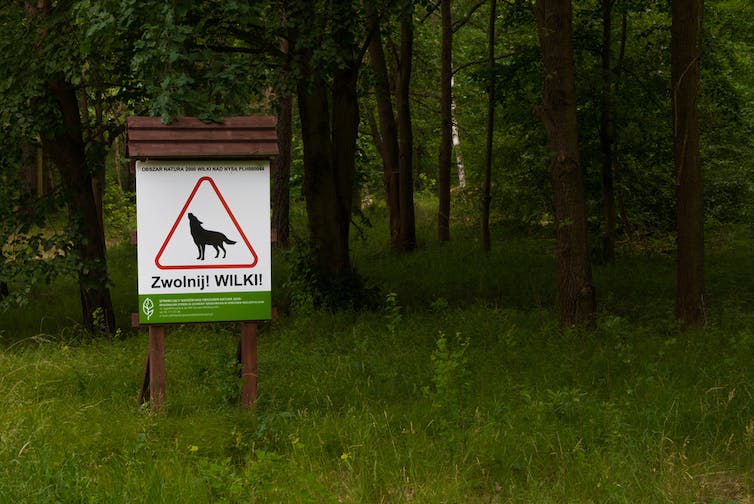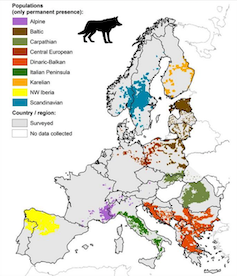Europe’s wolf problem is quickly becoming a source of social and political tension. Conservation efforts across the continent have been relatively successful, with worried politicians and farming and hunting groups calling for action. The European Commission is now proposing to change their international status from strictly protected to protected, which could allow people to hunt wolves.
Conservation Assessment: Council of Europe 2022; Map: IUCN (Boitani 2018), CC BY-SA
However, changing conservation status may not be the best solution, especially since only three of the nine wolf groups in the EU have achieved favorable conservation status.
Instead, perhaps the time is ripe for a renewed focus on learning to live with wolves. Proven prevention strategies, such as fencing and the use of guard dogs, play a key role in this.
But the question may be fundamentally philosophical. That is, it comes down to how to coexist and the cultivation of the moral principles and values that underpin successful coexistence.
Deep Ecology and Equal Right to Survival
In this task, the work of Norwegian environmental philosopher Arne Nss (1912-2009) may be helpful. NSS is known as the father of deep ecology, an ethical theory that holds that all life has intrinsic value. Nss believes that all living things, whether human or non-human, have an equal right to survive and thrive, a principle he calls biospheric egalitarianism.
Since this applies to wolves, Nss is clear: wolves have as much right to be here as we do.

Brd Lken/NTB, CC BY-NC-SA
Nss co-authored an article with biologist Ivar Mysterud stating: As part of human and non-human life on earth, the well-being of the wolf species has value in itself! Therefore, they argue, humans have no right to reduce this richness and diversity, including wolf habitats and races, other than to meet important needs!
Despite ostensibly posing a radical challenge to anthropocentric ethics, NSs demonstrates a pragmatic approach to how biospheric egalitarian principles can be applied in practice. For example, he considered important contextual factors in local wolf-human interactions, writing:
For some sheep farmers, the need to protect their sheep from wolves or to be compensated in some way is now paramount. This means protecting their economic base and the homes where they have lived for generations.
In addition to human benefits, he takes seriously his moral obligation to reduce the suffering of sheep and other livestock. This is especially true since humans have reduced these species’ ability to hide from wolves.
Mouflons are the wild ancestors of domestic sheep, and they try to escape into the mountains to escape large predators. By comparison, modern livestock have poorer genetic defenses due to thousands of years of selective breeding and are left to fend for themselves in fenced fields.
People not only have brains, but also have hearts
NSS avoids taking a one-size-fits-all answer to the question of wolves (a stance criticized by other scholars). But his focus on articulating general ethical principles as a context for situational decision-making may be important as this rewilding debate becomes increasingly heated and politicized.
For example, Nss uses the term mixed community to mean a place composed of humans and species that play a clear role in human affairs. Nss challenges the tendency to define community in solely human terms, arguing that this framework helps to break down some of the barriers that are typically established between humans and any other life form within our shared space.
Doing so can open the way to increased identification with and empathy for nonhuman others, a capacity that Nss believes all humans possess and that stems from the inherent continuity between human and nonhuman life.

Michael Schroeder/Shutterstock
Indeed, as the pioneering American environmentalist Aldo Leopold similarly argued, seeing oneself as in a community with others is a prerequisite for ethical action. In this case, it helps crystallize the concept of wolves’ right to exist, that they are members of the community just like us.
There may be some merit in applying this ethical framework of mixed communities to current EU deliberations. For example, it could inspire further development of creative, mutually beneficial solutions, such as financial compensation for livestock losses and improved wolf attack prevention called for by the National Social Security Administration. It may also play an effective role in dispelling the unfounded fear and hysteria surrounding wolves (the National Social Science Service blames the Brothers Grimm for the animals’ poor public image).
Perhaps most important, though, is the potential to connect with our emotional elements. As Nss said: People not only have a brain, but also a heart.
To achieve sustainable coexistence, it is not enough to appeal to abstractions of scientific interests or to design perfectly effective compensation plans. This must also come from a sense of solidarity with other species, a full realization that, in Nsss’s words: humans are not alone on this planet.
Interestingly, as a recent study showed, the majority of people living in rural communities in the EU already believe that wolves have a right to exist, which corresponds with NSs’s relative optimism about the possibility of mixed communities. This is all the more important to remember given the fraught political divisions related to Europe’s so-called wolf problem.
#Europe #wolf #problem #late #Norwegian #philosopher #solution
Image Source : theconversation.com
